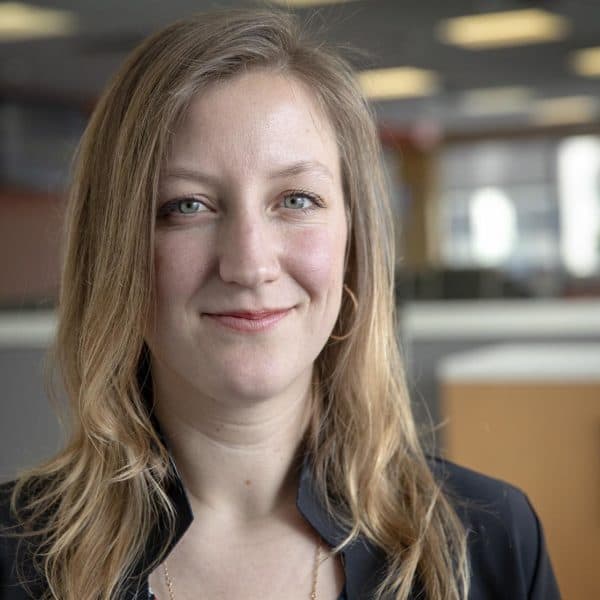Advertisement
No one asks how new dads are doing. A pilot program aims to help
Resume
For decades, federal surveys have tracked the health and habits of new mothers.
Now, Democrats in Congress are working to drum up federal support for a program that tracks the health of new dads during their child's earliest years of life.
“A lot of folks, honestly even in scientific fields, don’t understand that [monitoring dads] has a positive effect not only on dads, but on mothers and in children,” said California Democratic Rep. Jimmy Gomez, a first-time dad and co-founder of the Congressional Dads’ Caucus.
The government is mandated to randomly select new moms and ask them about their health and the health of their newborns through pregnancy and postpartum.
The Centers for Disease Control and Prevention works with states and local partners around the country to collect this data through the Pregnancy Risk Assessment Monitoring System. PRAMS asks questions about things like breastfeeding, support and safe infant sleep.
The data aims to inform policymakers who want to reduce health issues in early childhood and improve the well-being of families.
But since this effort started more than three decades ago, there's been a glaring gap: new dads have not been included. But that's slowly changing. Some states have introduced a public health program called PRAMS for Dads.
Georgia launched the first pilot in 2018. Now, the program is also underway in North Dakota, Massachusetts, Michigan and Ohio.
Dr. Craig Garfield, a professor at Northwestern University and a pediatrician at Lurie Children’s Hospital, helped create the program. Driven to his work by fatherhood, he says his goal is to see PRAMS for Dads in 30 states by 2030.
“One of my favorite things is being a dad,” he said. “I spent a year at home when my son was 18 months old as a stay-at-home dad, and that really opened my eyes. I was a white male physician at the highest social capital around, and I still felt like I was being kicked to the curb in this space with young children.”
5 questions with Dr. Craig Garfield
Why does tracking the health of dads matter during a child's early years?
“We know that dads have a big influence on the health and well-being of families in general. And we're also starting to understand that the health of men themselves can be impacted by having a child as well.
“So it makes sense if we're worrying about families and we're thinking about parents and how best to make sure the parents are as healthy as they can be and children are as healthy as they can be, that we also include all the people that are taking care of the children, mothers, fathers — grandparents, even — I think are really important people to be considering when we think about the well-being of children.”
What have we learned from the tracking of moms, especially moms who've just given birth — who are postpartum — when the government randomly keeps data on them and asks them questions?
“So the CDC has been running the Pregnancy Risk Assessment Monitoring System for over 35 years, and it does a great job. And it's a flagship model of surveys in the period from pregnancy through the first year of life. And we get really important data, like, do moms have access to health care? Do they access their pregnancy appointments in the first trimester? Are they exposed to secondhand smoke? Are they drinking? Are they breastfeeding? So the PRAMS survey is really useful in collecting that data and by doing it at a randomization at the state level.
“Ultimately, what the CDC is able to do is represent 81% of births across the country. And it was only after about 35 years that the moms started to write in the margins of the survey. ‘Why is the only question you asked me about my partner was did my partner hit, kick, beat or slap me during pregnancy?’
“They went on to write that the only way they made it through their pregnancy was with the help and support of their partner. So it was at that point that we were approached to say, how would you actually ask dads, where would you find them? And what kind of information would you want to get from dads?”
Advertisement
What do you think you can learn from tracking dads? What kinds of questions do you ask?
“Some of the important questions that we ask are all key public health initiatives. We ask about dads’ access to health care. So does a dad have a doctor to go to and have they been to a doctor in the past year? What is their mental health? What is their use of family leave? Are they able to take leave?
“What we found in Georgia was actually really surprising. There were only about 50% of dads, half the dads actually, [who] had a primary care doctor that they could go to. And significantly fewer had even been to a doctor in the last year. So you can think about that just in terms of the health of the dad themselves. About 70% of the dads are overweight or obese. 20% were smoking and 13% were engaged in binge drinking. And about 10% of dads endorse depressive symptoms.
“So [those are] kind of similar numbers to what we see in national data anyways. And that's really important when you think about the well-being of parents who now have to take care of a new baby. We also found when we asked about leave that only about 75% of dads had any sort of leave. And I think that's indicative of the fact that most dads are back at work less than two weeks after the birth of their baby because of the lack of a quality leave program here in the United States.”
Is it correct that a program like this for dads has no federal funding?
“Yeah. So we started with some initial funding from the CDC as part of an innovation grant and through a lot of hard work with collaborators in the Georgia Department of Public Health, and the CDC, and Lurie Children's Hospital, we were able to get that up and running in one state.
“Now we're in four additional states, but each one has to come up with its own funding, and that's been one of the stumbling blocks. We need some sort of equity in the maternal and child health space to include fathers and to recognize that it's not a zero-sum game, that when we support mothers and we support fathers, we're actually betting on the best outcomes for children.”
What’s a specific example from Georgia of something you’ve learned about dads that may be a straight line to change to help young children?
“So we learned in Georgia when we asked about dads’ behaviors with their babies, we asked dads how often are they putting their child to sleep? And 99% of dads said that they put their child to sleep. However, only 16% actually practiced all three safe sleep behaviors of putting the child on their back to sleep on an approved sleep surface with no soft bedding. So that's a really easy opportunity to try and improve the education for fathers around safe sleep behaviors. That really starts on day one after the baby's born.
“I think what typically might be happening in a hospital, and as a pediatrician, I see this happen all the time while we're explaining to mom the importance of safe sleep behaviors, that dad is probably at the parking garage picking up the car to go pick up mom. So I think there [are] a lot of opportunities at the public health and state level as well as at the local hospital and pediatrician level.”
This segment aired on June 11, 2024.

